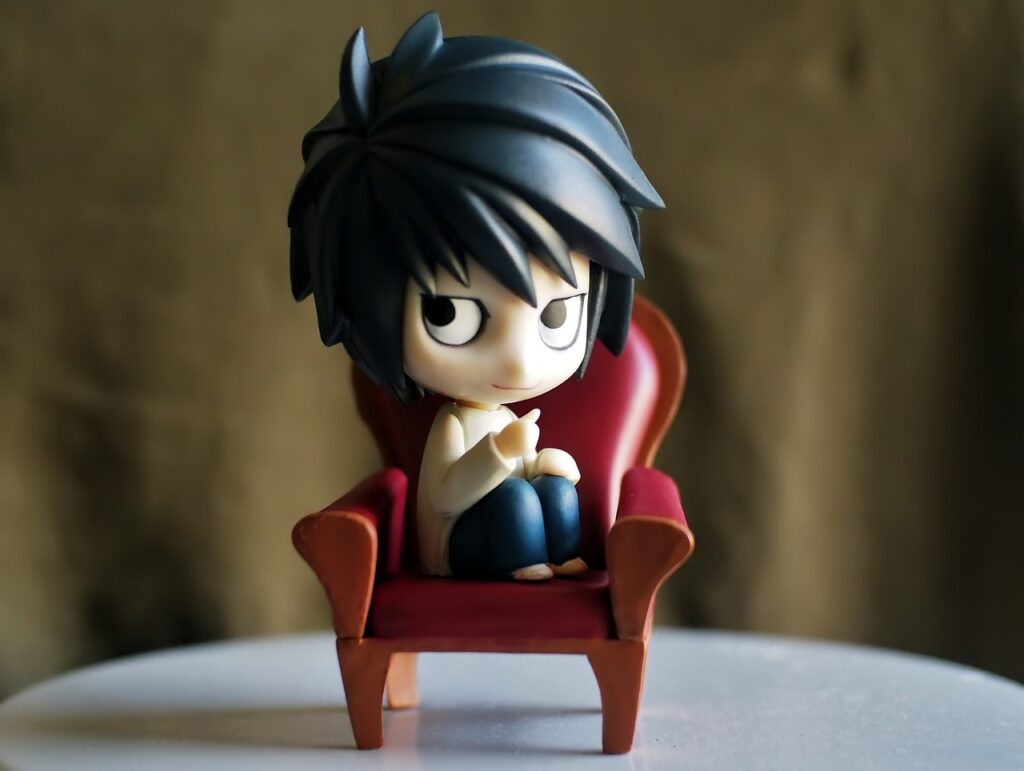
“Onee-chan wa Game o Suruto Hito ga Kawaru” is a Japanese anime series that explores the world of otaku culture and game-themed storytelling. The term “Onee-chan” refers to an older sister, while “Game o Suru” translates to “playing games.” The anime follows the story of a girl who becomes engrossed in gaming and experiences a transformation in her personality as a result.
This series delves into the fascinating world of otaku culture, which encompasses various hobbies and interests related to anime, manga, gaming, and more. It offers an in-depth look at the passions and obsessions that drive individuals within this subculture.
As a game-themed anime, “Onee-chan wa Game o Suruto Hito ga Kawaru” likely incorporates elements of video games, virtual reality, or game mechanics into its storyline. This can create an immersive and engaging experience for viewers who enjoy both gaming and anime.
If you’re interested in exploring the world of otaku culture or enjoy game-themed storytelling, this anime series might be worth checking out. It can offer a unique perspective on the influence of hobbies and interests on an individual’s personal growth and development.
The Evolution of the “Onee-chan” Trope in Anime and Manga
Anime tropes are recurring themes or elements that are commonly found in anime and are used to create certain character archetypes or storylines. One popular character archetype in anime is the “onee-san” character, which translates to “big sister” in English. The onee-san character is typically an older sister figure who exhibits caring, nurturing, and sometimes authoritative traits towards their younger siblings or other characters.
Exploring The Flower of Veneration Chapter 1
Sibling relationships are a common theme in anime and can be portrayed in various ways. Some anime series focus on the bond between siblings, showcasing their love and support for each other. These relationships can range from close and affectionate to rivalrous and competitive. Sibling dynamics often contribute to character development and storylines, providing opportunities for growth, conflict, and emotional depth.
There are many popular onee-san characters in anime that have captured the hearts of fans. Some notable examples include:
1. Rukia Kuchiki from “Bleach” – Rukia serves as a mentor and older sister figure to the protagonist, Ichigo Kurosaki. She is strong-willed, protective, and has a nurturing nature.
2. Erza Scarlet from “Fairy Tail” – Erza is known for her strict personality, but she also cares deeply for her guild members and friends. She often takes on a maternal role, guiding and supporting her teammates.
3. Mikasa Ackerman from “Attack on Titan” – Mikasa is fiercely loyal and protective of her adoptive brother, Eren Yeager. She is skilled in combat and is willing to do anything to keep him safe.
4. Hinata Hyuga from “Naruto” – Hinata is a shy and gentle character who develops a strong bond with her younger sister, Hanabi Hyuga. Throughout the series, Hinata’s love for her sister motivates her to become stronger.
These are just a few examples of popular onee-san characters in anime. Their presence adds depth and emotional complexity to the stories they are a part of, making them memorable and beloved by fans.
The Role of Video Games in Shaping Otaku Culture and Identity
The otaku lifestyle revolves around a deep passion for various forms of popular culture, particularly anime, manga, and video games. Otaku culture has gained immense popularity globally, with fans embracing its unique aesthetics, storytelling, and immersive experiences.
The Truth Behind Rumors of Elon Musk Buys xVideos
Video games play a significant role in the otaku lifestyle, serving as both a form of entertainment and a means of connection. Gamers often immerse themselves in virtual worlds, exploring intricate narratives and engaging in thrilling gameplay. From classic console games to online multiplayer experiences, video games provide an escape from reality and allow individuals to express their creativity or engage with like-minded communities.
Gaming can be seen as a form of escapism, offering an opportunity to temporarily detach from the stresses of everyday life. Through video games, individuals can embark on epic adventures, solve complex puzzles, or compete against others in various virtual arenas. This sense of escape can provide a much-needed break from reality and serve as a source of relaxation and entertainment.
Furthermore, the influence of gaming extends beyond the digital realm. Game-themed media such as movies, TV shows, and even merchandise have become increasingly popular among otaku and gamers alike. These adaptations often bring beloved characters and stories to life in new ways, appealing to fans who want to extend their gaming experience beyond the screen.
In conclusion, the otaku lifestyle embraces video games as an integral part of its culture. From the immersive nature of gaming to the sense of escapism it offers, video games provide an avenue for expression and connection within the otaku community. Additionally, game-themed media adds another dimension to this passion by allowing fans to further engage with their favorite gaming franchises outside of gameplay.
Exploring the Themes and Messages Portrayed in “Onee-chan wa Game o Suruto Hito ga Kawaru Onee-chan”
“Onee-chan wa Game o Suruto Hito ga Kawaru Onee-chan” is an anime series that revolves around the concept of a sister transforming into a completely different person after becoming engrossed in video games. The show explores various themes, including character development and its impact on viewers.
Character development is a crucial aspect of any storytelling medium, including anime. In this series, the main character’s transformation from an ordinary sister to a game-obsessed individual provides a unique opportunity for character growth. As the story progresses, we witness her struggles, triumphs, and personal growth as she navigates the world of video games.
The anime explores the potential consequences of excessive gaming and how it can transform a person’s personality. Through this transformation, the series delves into deeper themes such as addiction, escapism, and the potential loss of one’s identity. It raises questions about the balance between real-life responsibilities and the allure of virtual worlds.
The impact on viewers can vary depending on their own experiences and perspectives. Some viewers may relate to the main character’s journey and find solace or inspiration in her personal growth. Others may see it as a cautionary tale, reminding them to maintain a healthy balance between their hobbies and real-life obligations.
Anime like “Onee-chan wa Game o Suruto Hito ga Kawaru Onee-chan” can also spark discussions about the influence of media on individuals and society as a whole. It serves as a reminder to be conscious of how our hobbies and interests shape our identities and interactions with others.
Overall, the character development in “Onee-chan wa Game o Suruto Hito ga Kawaru Onee-chan” offers an engaging narrative that explores themes of personal growth, addiction, and identity. Its impact on viewers can vary but has the potential to initiate meaningful discussions about the role of media in our lives.
The Influence of “Onee-chan wa Game o Suruto Hito ga Kawaru Oneeechan” on Fan Communities and Merchandise
Fandom culture refers to the community of fans who share a common interest in a particular subject, such as a TV show, movie, book series, or video game. These communities often develop their own unique language, rituals, and traditions that center around their shared passion.
One aspect of fandom culture that has become increasingly popular is the sale of merchandise related to these fandoms. Fans love to express their enthusiasm by purchasing items such as t-shirts, posters, action figures, and collectibles featuring their favorite characters or logos. This not only allows fans to show their support for the franchise but also provides a way for them to feel connected to other fans.
In addition to merchandise sales, fandom culture has given rise to vibrant fan art and cosplay communities. Fan art allows fans to showcase their creativity by creating original artwork inspired by their favorite franchises. This can include illustrations, digital art, or even sculptures. Fan artists often share their work online, creating a platform for interaction and appreciation among fellow fans.
Official Website
Cosplay, short for “costume play,” involves fans dressing up as their favorite characters from movies, TV shows, comics, or video games. Cosplayers meticulously recreate the costumes and accessories of their chosen characters and often attend conventions or events where they can showcase their creations. Cosplay not only allows fans to express their love for a particular franchise but also provides an opportunity for them to connect with other like-minded individuals.
Overall, fandom culture encompasses a wide range of activities and communities that revolve around shared interests and passions. It fosters a sense of belonging and camaraderie among fans while celebrating the creativity and dedication of individuals within these communities.
Conclusion: Reflecting on the Cultural Significance of “Onee-chan wa Game o Suruto Hito ga Kawaru Oneeechan”
The cultural significance of “Onee-chan wa Game o Suruto Hito ga Kawaru Oneeechan” is worth reflecting upon. This Japanese phrase translates to “When Big Sister Starts Playing Games, People Around Her Change,” and it refers to the influence that an older sister’s interest in video games can have on those around her.
In Japanese society, the concept of the “onee-chan” or older sister holds a special place. Older sisters are often seen as role models and have a significant impact on their younger siblings’ lives. This phrase highlights the idea that when an older sister starts playing video games, it can lead to a shift in the interests and behaviors of those around her.
This cultural phenomenon speaks to the power of influence within family dynamics and how hobbies and interests can be shared and passed down between siblings. It showcases the importance of older siblings in shaping the lives of their younger counterparts.
Furthermore, this phrase also reflects the growing popularity and acceptance of video games in Japanese society. It acknowledges gaming as a legitimate form of entertainment and highlights its ability to bring people together and create shared experiences.
Overall, “Onee-chan wa Game o Suruto Hito ga Kawaru Oneeechan” offers an interesting insight into Japanese culture, emphasizing the influence of older siblings and the impact of video games on interpersonal relationships.



